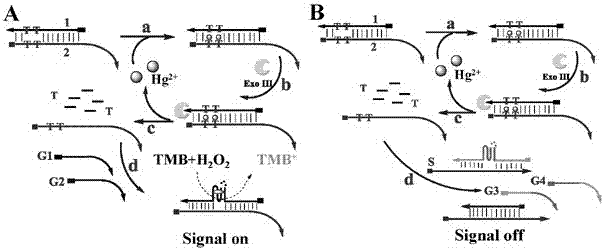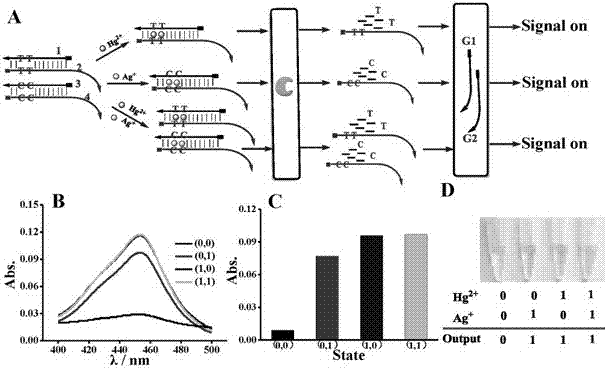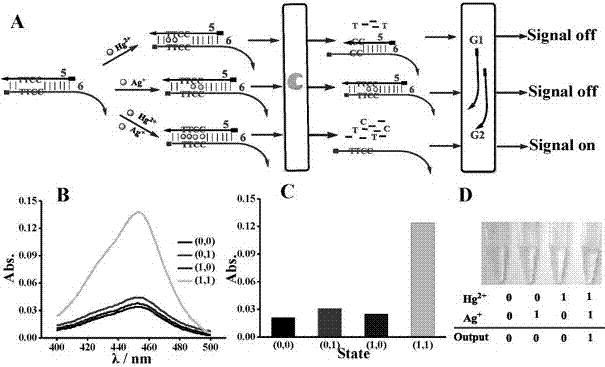Method for constructing DNA colorimetric logic gates based on metal ions regulating exonuclease III cleavage
A technology of exonuclease and metal ions, applied in the field of molecular computers, can solve the problems of insufficient sensitive and complete logic system, inapplicability of in-situ detection, etc., and achieve good selectivity
- Summary
- Abstract
- Description
- Claims
- Application Information
AI Technical Summary
Problems solved by technology
Method used
Image
Examples
Embodiment 1
[0026] Construction of OR logic gates
[0027] The basic principle of DNA logic gate construction is as follows figure 1 shown. Prepare quadruplicate solutions by mixing 20 µL of DNA 1 and 2 hybridization solution with 20 µL of DNA 3 and 4 hybridization solution. Add 20 μL of water to the above solution for (0,0) state, add 10 μL of Ag + (5 μM) is (0,1) state, add 10 μL Hg 2+ (5 μM) is in the (1,0) state, and at the same time add 10 μL Hg 2+ (5 μM) and 10 μL Ag + (5 μM) for the (1,1) state. Add 10 μL of Exo Ш to each sample and incubate at 37 °C for 30 min. Then, 20 μL of signal probe 1 was added to each sample to form G-quadruplexes, and then 10 μL of 2 μM hemin in HEPES buffer solution was added to react at room temperature for 1 h to form G-quadruplexes-heme prime complex. Finally, add 15 µL of TMB-H to each sample 2 o 2 solution, G-quadruplex-heme catalyzed TMB color development, after 4 minutes of reaction, 200 μL of 2 M sulfuric acid was added to terminate the ...
Embodiment 2
[0029] Construction of AND logic gates
[0030] Hybridize 20 μL of DNA 5 and 6 to make quadruplicate solutions. Add 20 μL of water to the above solution for (0,0) state; add 10 μL of Ag + (5 μM) is (0,1) state, add 10 μL Hg 2+ (5 μM) is in the (1,0) state, and at the same time add 10 μL Hg 2+ (5 μM) and 10 μL Ag + (5 μM) for the (1,1) state. Add 10 μL of Exo Ш to each sample and incubate at 37 °C for 30 min. Then, 20 μL of signal probe 1 was added to each sample to form G-quadruplexes, and then 10 μL of 2 μM hemin in HEPES buffer solution was added to react at room temperature for 1 h to form G-quadruplexes-heme prime complex. Finally, add 15 μL of TMB-H to each sample 2 o 2 solution, G-quadruplex-heme catalyzed TMB color development, after 4 minutes of reaction, 200 μL of 2 M sulfuric acid was added to terminate the catalytic reaction. The constructed logic gate was characterized by UV-Vis spectroscopy, the results are as follows image 3 shown. The absorbances of ...
Embodiment 3
[0032] Construction of INHIBIT logic gates
[0033] Mix 20 μL of DNA 1 and 2 hybridization solution with 20 μL of DNA 7 and 8 hybridization solution to make quadruplicate solutions. Add 20 μL of water to the above solution for (0,0) state, add 10 μL of Ag + (5 μM) for (0,1) state, add 10 μL Hg 2+ (5 μM) is in the (1,0) state, and at the same time add 10 μL Hg 2+ (5 μM) and 10 μL Ag + (5 μM) for the (1,1) state. Add 10 μL of Exo Ш to each sample and incubate at 37 °C for 30 min. Then, 20 μL of signal probe 1 was added to each sample to form G-quadruplexes, and then 10 μL of 2 μM hemin in HEPES buffer solution was added to react at room temperature for 1 h to form G-quadruplexes-heme prime complex. Finally, add 15 μL of TMB-H to each sample 2 o 2 solution, G-quadruplex-heme catalyzed TMB color development, after 4 minutes of reaction, 200 μL of 2 M sulfuric acid was added to terminate the catalytic reaction. The constructed logic gate was characterized by ultraviolet-vi...
PUM
 Login to View More
Login to View More Abstract
Description
Claims
Application Information
 Login to View More
Login to View More - R&D
- Intellectual Property
- Life Sciences
- Materials
- Tech Scout
- Unparalleled Data Quality
- Higher Quality Content
- 60% Fewer Hallucinations
Browse by: Latest US Patents, China's latest patents, Technical Efficacy Thesaurus, Application Domain, Technology Topic, Popular Technical Reports.
© 2025 PatSnap. All rights reserved.Legal|Privacy policy|Modern Slavery Act Transparency Statement|Sitemap|About US| Contact US: help@patsnap.com



